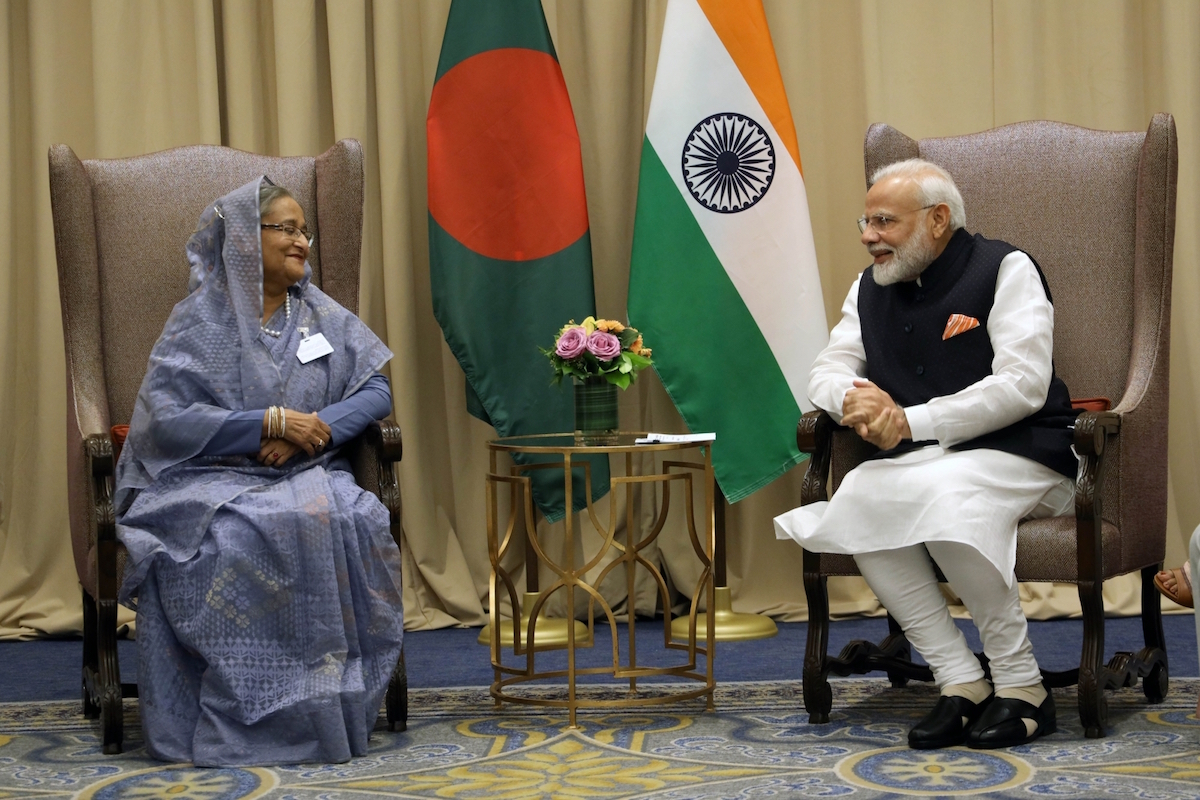On the day the West Bengal witnesses the first of its eight-phase state assembly elections, Prime Minister Narendra Modi may be heading for an unusual shrine in Bangladesh — Orakandi .
Orakandi is not far from Tungipara in Gopalgunj, the ancestral home of ‘Bangabandhu’ Sheikh Mujibur Rahman and daughter Sheikh Hasina, the now Prime Minister of Bangladesh.
Advertisement
It is the most sacred shrine of the ‘Matua’ community, a Hindu sect whose numbers are considerable both in West Bengal and Bangladesh.
Modi will reach Bangladesh on March 26, the day observed in Bangladesh as Independence Day, when in 1971, Pakistan’s brutal army unleashed ‘Operation Searchlight’, the genocide of Bengalis in tens of thousands that sparked the country’s struggle for freedom.
Modi has already expressed his desire to visit Tungipara, where the ‘Bangabandhu’ lies buried and the visit has been scheduled for March 27 after necessary security clearance arrangements by both Indian and Bangladesh security agencies.
March 27 is when West Bengal goes to its first phase of polls.
But Bangladesh security officials say they now have a fresh request, Modi wants a visit to Orakandi to pay respects to the Harichand Thakur, the founder of the Matua sect, who was born there on March 11, 1812.
“We are examining the security aspects of the proposed visit of Indian PM to Orakandi and once we are satisfied, we will clear the trip,” said a top Bangladesh security official. But he was unwilling to be named because he was not authorised to speak to media.
Other Bangladesh officials say that the clearance is a mere formality because Bangladeshis usually don’t deny visiting Indian dignitaries if they want to visit any part of the country for personal reasons. For instance, late Indian President Pranab Mukherjee would always visit the ancestral home of his wife in Narail.
Harichand Thakur formed the Matua Mahasangha and pitched it as a religious reformation movement around 1860 AD after attaining ‘atmadarshan’ in Orakandi in what is now Gopalgunj district (part of greater Faridpur) in today’s Bangladesh.
Thakur’s teachings establish education as pre-eminently important for the adherent and the upliftment of the population the adherent’s duty, while also providing a formula for ending social conflict.
Matua-Mahasangha believe in ‘Swayam-Dikshiti’ (Self-Realisation).
So anyone who has faith in the Darshan or Philosophy of God Harichand belongs to the Matua Mahasanga.
Santanu Thakur, the present leader of the Matua Mahasangha, is the BJP MP from Bongaon, his father Manjul Krishna Thakur was a former Minister in the state.
The ‘Matua’ vote is believed to be a decisive factor in the North 24-Parganas and Nadia district and the BJP is involved in a huge tussle with the Trinamool Congress (TMC) to win over the community whose numbers in Bangladesh, West Bengal and elsewhere is said to be close to 3 crores.
The Matuas have strongly pushed for the Citizenship Amendment Act to ensure Indian citizenship for a large chunk of the community who moved into West Bengal from Bangladesh after the Partition and specially after the 2001-02 anti-Hindu pogroms during the Khaleda Zia government in Bangladesh.
Despite no clear estimate, experts feel the Matua numbers are evenly divided in Bangladesh and West Bengal with a sprinkling elsewhere in India and outside.
Mamata Banerjee is close to ‘Boro Ma’ Mamatabala Thakur, the mother figure of the community, while Santanu is the first non-TMC MP from the community.
“If Modi manages to visit the Orakandi shrine and pray there , he would be the first Indian PM to have done so. That may touch a chord with the Matuas and swing their support towards BJP in the West Bengal polls,” says Bangladesh watcher Sukhoranjan Dasgupta.
“It is a smart move.’
Dasgupta is author of “Midnight Massacre”, a detailed account of the 1975 coup that killed Sheikh Mujibur Rahman with much of his family.
Analyst Ashis Biswas says the proposed Modi visit to Tungipara and Orakandi is a classic “two birds with one stone” move.
“The visit to Tungipara will doubtlessly go down well with Prime Minister Hasina and all pro-liberation forces in Bangladesh and revive memories of India’s role in Bangladesh’s liberation. The visit to Orakandi may help the BJP’s cause with the Matuas,” said Biswas.











